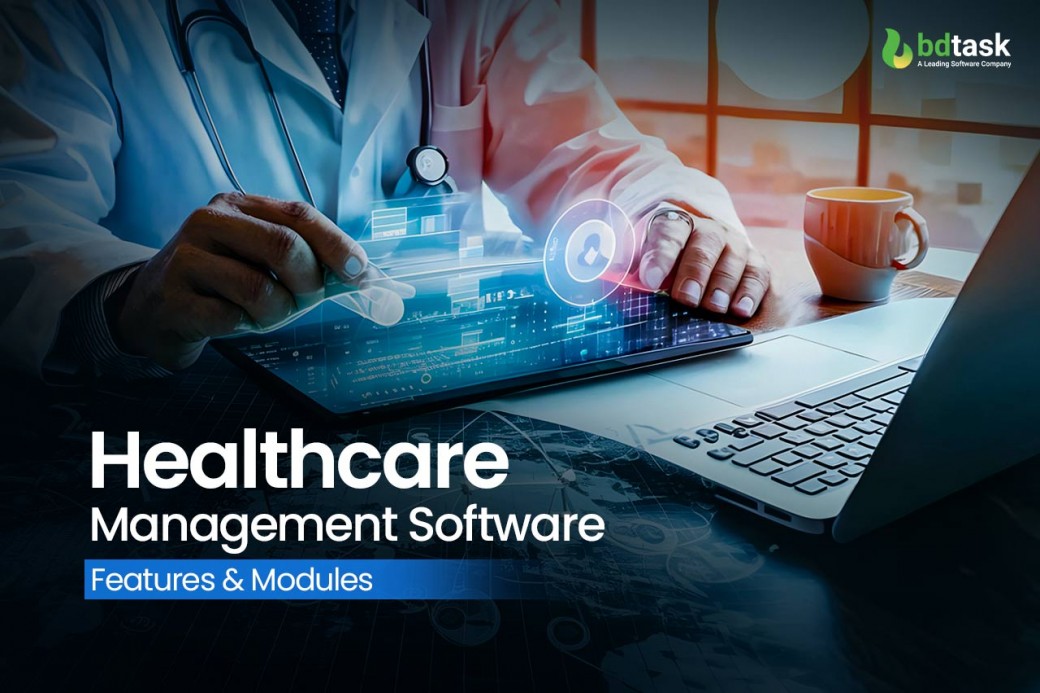Paperless Healthcare Management System - Features & Modules

As Technology improves, everything is becoming online-based. People nowadays are looking for the easiest way to do everything. In keeping with their needs, the healthcare management system is completely online-based, and whole hospital functions can be managed through this software. This system is capable of doing all the work without any paper. It integrates all the information about patients, doctors, accounts, prescriptions, insurance, hospital administrative details, and more with one software. It has various sections, such as the panel that makes up a hospital.
What is the Healthcare Management System?
Healthcare management systems include services that integrate and simplify the work of healthcare professionals and their interaction with patients. It is online patient management and appointment and scheduler application software. For getting appointments easily over the internet, it is the best one to use. In this system, people can select doctors and time schedules according to their category from the website. It converts all the paper works into digital form.
The healthcare management feature list focuses on admin, patients, doctors, nurses, accountants, and other hospital staff. All have their panel, but the admin can control everything. All hospital activity records can be kept digitally regularly. It will help professionals to keep track of their work.
Benefits of Healthcare Management System
The benefits of a hospital management system are many. All over the world, many hospitals are using automation software to make your hospital work easier, and it's increasing. It's all about reaching a value of USD 130.38 billion.
1. Digital Data Records
In the healthcare management system, accessing patients' previous and recent data by their ID is easy. Patient information can be recorded according to their age, gender, and disease. So it’s easy to find them easily with their data.
2. Improved Relationship
It improves the communication and interactions of doctors with their patients. Before the appointment, the doctor can see the patient's condition through the information given before the appointment. So it’s easy for them to interact with that patient.
3. Easy Communication
It helps to upgrade the user experience. Medical specialists, patients, and hospital authorities can contact each other online, make appointments, and exchange information.
4. Less Time Consuming
This software can engage all staff in one frame. Now, they don’t need to make a special request or wait too long for an answer. Everyone has their panel, and they can request or send a message if there is any urgency. It not only saves their time but also improves the management.
5. Facility Management
In this system, hospital authorities can manage their available resources and analyse staff work. It reduces the equipment downtime, optimises the supply chain, etc. Another point worth mentioning is that hospital staff deal with digital data rather than on paper.
6. Easy To Go The Right Direction
Management can monitor every financial activity. It includes expenses, profits and losses, bills and tax payments, and inpatient and outpatient billing. Financial awareness helps to analyse the business prospects quite clearly and move in the right direction.
7. Better Customer Experience
Since the healthcare management system is patient-oriented, the treatment process is less stressful. Before the appointment, the doctor will know the patient’s details online. So it will be easy for both of us to interact with each other. The doctor will get more time to analyse the patient's condition. Also, patients can get doctor information from home by being informed about their health condition. In that case, they don’t need to go to the hospital.
8. Online Prescription
It is often impossible for people to go to the doctor suddenly with many problems. So they can easily send their issue to the doctor through their panel at that time. Then, the doctor can check it from their side and provide them with a prescription. When the doctor sends the prescription, the patient can view it from their side.
9. Improved Safety
It minimizes the cost of an organization because of less paperwork. It improves safety and reduces duplication of testing. It stores all the data and manages it without any errors. With the help of hospital management software it overall protects your medical confidential data from various cyber threats.
Automation Of Healthcare Management
For many valid reasons, the healthcare management system needs an entire hospital automation system. This system's main aim is to take care of the functional aspects of the whole hospital so that the Medicare Center can concentrate on improving patient care.
Automation helps to handle the general process, which involves the different healthcare services. The purpose of the healthcare management system is to manage employee and patient activities remotely. With instant access, they can reach authorized users.
A patient-centred and well-managed organization will ensure a better work environment for their employees. When patients want to make an appointment, they can choose from a few options. First, you can see the list of doctors with specialities. They can see their schedule and choose a convenient time for an appointment.
Also, for booking an appointment, you can call the receptionist, who will check the schedule for you and set your appointment. In both ways, when appointments are completed, ll get an SMS on their mobile device and an email at their mail address.
Automation speeds up the registration of patients and the filling out of all required records. Doctors can check the history of the disease, check the test results, and add new data to the patient's file.
The work of a doctor that previously involved too much paperwork can be fully computerized. So, Doctors spend more time treating patients than documenting. Also, if something is requested in writing, they can print it.
How Does The Healthcare Management System Work?
The healthcare management system is fully online-based software. In this system, a whole hospital work can be done smoothly. There is a website and also an admin panel. From the admin panel, all work can be monitored. Admin can check all the issues.
From the website, the patient can take their appointment to check the doctor's schedule. This system records patients' medical and basic information. The doctor can see it anytime and also they can give suggestions. Doctors can also provide online prescriptions from this system.
This healthcare system has all different types of panels. So it’s easy for the admin to monitor everyone's work. All medical staff and hospital staff can do the right thing with this system. So it will be easy for the authority to take any decision for the future betterment.
Features of Healthcare Management System
When hospitals consider applying this approach, they need to learn how to develop a hospital management system. Planning and prioritization is an important step. It outlines the expectations and effectiveness of getting the treatment company to the final stage. Qualified developers usually offer a list of proposed hospital management system project modules.
1. Doctors Management
Healthcare management system features include the list of the doctors and their schedules. It also includes doctors' online appointments. The system has an extra panel which they can check their schedule and others'. That's why this helps the doctor to edit according to his schedule. It includes a list of medicines available for certain diseases so doctors can easily find alternatives if needed. Patients can choose their doctor to check their schedule.
Also, before the appointment, patients must provide their basic information and a brief description of the problem. So, without any hassle, doctors already have basic information.
2. Patient Information
New patients can be registered in the system. Old patients can make appointments easily to show their previous records. An electronic medical record system is built that stores all the patient's primary and treatment details. Also, a feature stores photos of patients as proof of identity. This can help in medical-legal cases of false identity or forgery.
3. Appointment Module
There are two ways to make the appointment here. One is from the website, and the one is the patient can call directly to make the appointment. Over the phone, they can give them all the info and confirm the schedule.
4. Account Management
The staff management module provides human resources administration. It updates staffing details and hospital structure and tracks recruitment records. It includes the nurses' and ward boys' names and times on duty and their respective ward numbers. The instructions given to the nurse for each patient have been entered into the system.
5. Occupancy
Quick room/bed management availability can be verified using HMS so that the receptionist can adjust the transfer of patients from one ward to another. Also, they can assign a bed to a new patient. This information is updated regularly to monitor the patients' relief. This section also includes a detailed schedule of operation theatres. It helps the receptionist or nurse to know which theatres are empty to perform other surgery slots.
6. Staff Management
The staff management module provides human resources administration. This includes the names and times of the nurses and ward boys on duty and their respective ward numbers. It comprises laboratories, pharmacists, case managers, receptionists, and representatives. It keeps all records of their staff.
7. Supplies Control
This software keeps track of everything. So it’s easy for management to find out which needs to supply. Only one click is required to check the store. A complete list of hospital surgical instruments, medicines, laboratory supplies, stationery, staff supplies, etc. can be maintained. This record helps the administration monitor usage and control wastage.
8. Laboratory and Test Management
The healthcare management system is updated to the HMS only when the doctor advises a certain list of tests. It is accepted directly by the laboratory. The lab management module displays test results for specific patients. Also, there is a data lab for viewing and reporting patients. It is usually integrated with other hospital information system modules for better performance. This interfacing helps reduce the errors caused by staff. Patients can retrieve and review past reports anytime because all data is fed into the system. It also includes the blood bank details.
9. Billing
Here is a separate automatic category system for billing management. Healthcare management helps cover all the patient's expenses at once and produce a complete bill at the end of the consultation or the end of the discharge. This saves time and effort for each department as they do not need to be manufactured separately.
10. Insurance
The concerned insurance company can make the process of passing the claim further by checking the details. This records the patient’s insurance details. It includes the policy number, the insurance company information, and about their policies. This data is stored in a database so the hospital patient or insurance company can retrieve it for any subsequent use.
11. Helpdesk and Support
The healthcare management system has an extra inquiry and support system. This module specializes in managing various issues and requests. This ensures that operations are properly maintained and data is validated and reported accordingly.
Conclusion
Considering all the above, the healthcare management system is a complete hospital software. It is a part of the life cycle of a modern medical institution. It automates so many daily activities and enables users to interact easily. So, developing hospital system software is a great opportunity to create unique, efficient, and fast-delivering healthcare models. Implementing the hospital management project assists in maintaining all kinds of records, providing coordination and user communication.
It also improves the implementation of policies and the development of day-to-day operations. So, this beneficial decision incorporates the need for patients, staff, and hospital authorities and facilitates their interaction. This has become the ideal for running a hospital. Many clinics have realized its benefits and continue developing new hospital management system project modules. In conclusion, healthcare system software is a great solution for any hospital organization.










